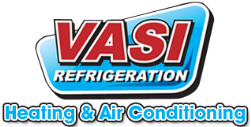As the HVAC industry evolves, so do the regulations that govern it. Starting in 2025, a new mandate will affect the type of refrigerants used in air conditioning and refrigeration systems across the U.S., and if you’re a homeowner or business in the Boston North Shore area, it’s important to understand how this change could impact you.
What’s Changing in 2025?
In 2025, the Environmental Protection Agency (EPA) will require all new HVAC systems to use refrigerants with a lower Global Warming Potential (GWP). Specifically, this mandate is focused on phasing out the use of R-410A, a refrigerant widely used in residential and commercial systems today. R-410A will be replaced by more environmentally friendly alternatives, such as R-32 and R-454B, which have significantly lower GWP ratings.
This shift is part of a broader effort to reduce the environmental impact of refrigerants, which contribute to greenhouse gas emissions and global warming. By transitioning to refrigerants with lower GWP, the HVAC industry is playing a crucial role in combating climate change.
Will AC Units Be More Expensive in 2025? Absolutely.
One of the biggest questions on homeowners’ minds is: Will AC units be more expensive in 2025? The short answer is yes. Expect prices to increase by about 20-30%. Why? Manufacturers are required to adopt new technologies and materials to comply with the 2025 refrigerant mandate. These changes will result in higher production costs, which will be passed on to consumers.
This price increase will not only apply to the refrigerants themselves but also to the entire HVAC systems designed to handle them. Systems will need to be more efficient, environmentally friendly, and safe to accommodate the new, lower-GWP refrigerants, and these innovations come at a cost. As a result, purchasing a new air conditioning system will likely be more expensive than it is today.
What Does This Mean for You?
If your system uses R-410A, don’t worry—there’s no immediate need to replace it. The new regulations only apply to new systems being manufactured after 2025. However, there are a few key things to keep in mind:
- Rising Costs for R-410A: As the production of R-410A decreases, the price of this refrigerant will likely rise. If your current system needs repairs or a refrigerant recharge after 2025, you might find that the cost of R-410A is higher than it is today.
- Future Repairs and Maintenance: While R-410A will still be available for servicing older systems, it may become more expensive and harder to find as the phase-out continues. Planning ahead by maintaining your system properly or considering a transition to a newer system could save you money in the long run.
- Energy Efficiency Improvements: The new refrigerants, like R-32 and R-454B, are not only better for the environment but are also designed to improve energy efficiency. When it comes time to replace your system, upgrading to one that uses these new refrigerants can lower your energy bills and reduce your carbon footprint.
- Safety Considerations: Some of the newer refrigerants are mildly flammable, which is why the HVAC industry is working hard to ensure proper training and safety measures for their handling. Working with a certified HVAC technician, like the team at Vasi Refrigeration HVAC, ensures your system will be installed and serviced safely and correctly.
How to Prepare for the Transition
Although the new mandate won’t require immediate action for most homeowners, it’s a good idea to start thinking about the future of your HVAC system. Here are a few steps you can take:
- Schedule Regular Maintenance: Regular maintenance helps ensure your current system is running efficiently, which can extend its life and delay the need for a replacement.
- Plan for System Replacement: If your system is aging, it might be worth considering a replacement in the next few years. Newer systems that comply with the 2025 refrigerant mandate will not only be more energy-efficient but will also save you from dealing with rising R-410A costs.
- Consult with an Expert: The team at Vasi Refrigeration HVAC is here to help. We can assess your current system, provide guidance on when it might be time for an upgrade, and explain the best options for new, compliant HVAC systems.
The Bottom Line
The 2025 HVAC refrigerant mandate represents an important step toward a more sustainable future. While it may seem daunting at first, planning ahead and working with experienced professionals can make the transition smooth and cost-effective. If you’re in the Boston North Shore area and have questions about how these changes will affect your HVAC system, Vasi Refrigeration HVAC is here to help. Contact us today to learn more about how we can assist with your HVAC needs.
